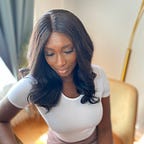The Balancing Act: Pro-Blackness and Interracial Love
About 9 months into my relationship with Tino, I was sitting with my mother on her couch, when she let out a series of prolonged sighs. I asked what was wrong, and looking me squarely in the eye, she exclaimed, “It’s my fault that you’re with a white man…I made you watch all those Turner Classic Movies with Cary Grant and Gregory Peck.” I doubled over with laughter and immediately questioned if she was serious. When I looked into her eyes, they confirmed the gravity of her statement.
Over the past month, I’ve wrestled with the age old question, can a person be pro-Black and still have a partner of another race? My husband is a fair skinned German man and I am a dark skinned Afro-Caribbean American woman. Throughout our relationship, we have faced our share of racism and prejudice as an interracial couple. We have even walked away from some relationships that were not champions of our love. Yet, despite all of this, race has never been the biggest obstacle in our union.
With the recent state sanctioned murders by police in the United States, much attention has been focused on racism in all aspects of American society. Some evenings, I have found myself wondering if by marrying my husband, had I subscribed to Eurocentric ideals and told myself otherwise? However, by the first sound of my alarm clock in the morning, when I turn to my husband, I can’t imagine being married to anyone else.
From our first Skype date, I told Tino that I had over $200,000 in student loan debt from medical school. Since revealing that fact wasn’t a deal breaker, we proceeded to talk about our parents, our upbringings, and our hobbies. During those 5 hours of conversation, we eventually worked our way to race. I told him of the systemic racism in the United States and how racial prejudice could vary from state to state. He discussed that the German educational system taught students about prejudice after the Jewish Holocaust; but dismissed the ‘silent racism’ endured by African and Turkish immigrants. To this end, despite assertions that the past few weeks must have been especially challenging for us as a couple, race has never been a taboo topic of discussion in our relationship.
Maybe because I was raised by a mother with Pan-Africanist beliefs; or maybe my summers in Senegal allowed me to soak up African culture beyond slavery and colonialism. Or maybe because I chose to attend an HBCU because high school was too racially charged. Or maybe I’ve always just seen race relations as they are and not how they are supposed to be. Therefore, it has not been difficult for me to discuss black identity and racism, within our marriage.
So, during these turbulent times, through my readings and having candid conversations with my husband, I’ve redefined some core principles about race and love:
- I do not believe in a colorblind society. I understand that race is a social construct. However, ‘whiteness’ has endured for centuries; and merely exclaiming “we are all humans”, cannot upend a racist society that is rotten to its core.
- I do not believe that love can trump hate. My love for my husband and my husband’s love for me, cannot erase centuries of Black people’s persecution by White people. I do not believe that my future biracial children will magically rectify the social and economic inequities propagated against Black people.
- We will discuss race openly with our offspring. One biracial friend recently shared with us that his parents never addressed race, resulting in a long-lasting identity crisis for him and his sibling. He taught us that it is essential to talk about race with young children, to decrease future feelings of confusion and angst. My husband and I have agreed that our future children will be raised as Black.
- Colorism plays a role in relationships, both intraracially and interracially. Colorism is the “foot soldier of anti-black racism”, as it upholds the color hierarchy within the Black community. I can contend that solely due to my dark skin, I have been told that I didn’t fit the “wife template”. All shades of blackness must be protected and valued; and Black women must be free to love and be loved, without having to conform to Eurocentric ideals of beauty.
- Dating a Black man does not mean he celebrates his Blackness, by default. In the past, I have dated some Black men that did not celebrate me or my type of Blackness. In most instances, these individuals did not embrace their own Black identity, and subsequently projected their issues onto me. Similarly, I have dated some white men who publicly ascribed to liberal ideals, but privately harbored deep rooted prejudice against people of color. In the end, I chose to be with a person who loves me and who celebrates my authentic self; who understands his societal privilege, yet on a daily basis stands against racist ideologies and practices.
So reader, I pose the question to you, is it possible for you to love your Blackness, and yet share your life with someone of another ethnic/racial group?
Read more at https://www.amtaarwellness.com/
